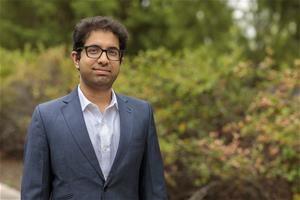Oct 5, 2020
Creating new marketing mechanisms for a changing digital world
Every minute you’re online, data is being exchanged — not just between you and the site, but between a growing number of advertisers, data analytics companies, and other third parties attempting to monetize that experience. Your data can be sliced, diced and disseminated in countless ways. And Sameer Mehta is interested in all of them.
 “Broadly, I’m interested in designing mechanisms for technology marketplaces,” says Mehta, who will be joining Gies as an assistant professor in the Department of Business Administration this fall.
“Broadly, I’m interested in designing mechanisms for technology marketplaces,” says Mehta, who will be joining Gies as an assistant professor in the Department of Business Administration this fall.
Originally from India, Mehta completed a bachelors and master’s in mathematics at the Indian Institute of Technology. But as his learning advanced, so did his interest in business operations and the information systems behind them. “I had taken a few courses in my master’s related to operations research, and I found they were quite quantitative and catered to my taste,” explained Mehta. “I was also very interested in how the logistics in different companies are managed, what sort of strategies they use, and how the pricing of different products is done.”
Pricing is relatively easy when you’re dealing with goods with a fixed cost, but how do you price something more nebulous, like data? Mehta became curious about that during his PhD studies at the University of Texas at Dallas. With each seminar, he found himself asking questions about the data that informed each class discussion. Where did it come from? How was it purchased? And who were the key players involved?
“There are very few firms that control a lot of information in this market, and the way they operationalize the flow of data is very unique in some ways,” explained Mehta, who wanted to understand the key differentiating features of these vast data exchange companies — and, more importantly, how they priced the datasets they sold. To do that, he connected with Narrative, a major data exchange located in New York. With their help he studied various aspect of data management and developed a new mechanism designed to optimize the monetization of data.
In a separate research project, Mehta also explored how ad exchanges auction impressions online. Traditionally, an exchange sells one impression per web visit, which means a viewer will see an ad from one company in one slot the entire time they’re on a particular page. But not all viewing sessions are the same. Mobile users, for example, tend to be more engaged, which means that they stick with ads for longer than they might if they were visiting from a desktop or tablet. Mehta reasoned that ad exchanges could allocate multiple ads to one slot if they had the right mechanism. But how many ads could be run, and how should they be sequenced? Using his math skills, he answered those questions, creating a mechanism that enabled multiple advertisers to bid on the same slot and allocate their ads effectively in real time.
Mehta’s arrival furthers Gies’ commitment to expanding and integrating efforts around analytics. The University of Illinois-Deloitte Foundation Center for Business Analytics is a College-wide center led by faculty from across Gies Business. The business undergraduate core curriculum includes two semesters of business analytics, and that commitment continues as each major builds on those initial courses and aligns analytics into their program. The College also prides itself in broad-minded faculty, like Mehta, leading analytics efforts
At Gies, Mehta will be teaching an e-business management course that explores how companies are adapting business strategy in the era of social media. From Facebook to TikTok, they’ll look at engagement across platforms, as well as the unique challenges presented within this digital framework.
“Rapid advances in technology offer a lot of advantages, but there’s also a lot of destruction to existing businesses as new social media platforms emerge,” said Mehta. In his class, they’ll explore these dynamics, as well as hot topics like fake news and accountability, serving up classroom discussions as fresh as the morning headlines.
“I’m really excited and honored to be part of the Gies family,” said Mehta, who looks forward both to teaching and continuing his research at his new home. “The faculty members are quite passionate about their research, and I see a lot of opportunities to collaborate with my colleagues because of the overlap of research interests.”
